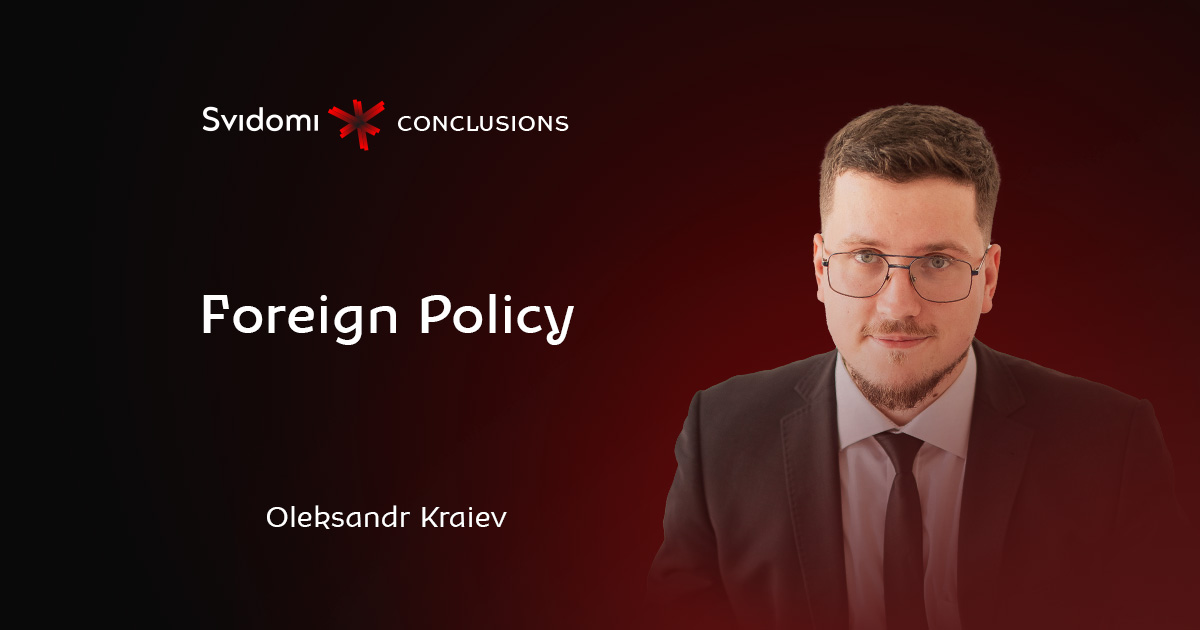Conclusions: Foreign Policy. Oleksandr Kraiev

For the third year in a row, at the end of December, Svidomi conducts summary broadcasts on our Ukrainian Instagram page, where it talks about what has changed in Ukraine over the year in various areas: the military, culture, medicine, education, the judiciary, and the political sphere.
Foreign policy is one of the constant topics of our broadcasts. This time, we will discuss this topic with Oleksandr Kraiev, an expert researcher on North America and the UK of the Ukrainian Prism Foreign Policy Council. Oleksandr is an international relations columnist for several Ukrainian and international media. He is also a post-graduate student at the Taras Shevchenko National University of Kyiv. Key academic and professional areas of interest include the UK and US foreign and domestic policy, the Irish border dispute, hybrid warfare, and contemporary conflict.
The most essential characteristics of Ukrainian diplomacy this year
Diplomats have created the doctrine of "war diplomacy." Unlike other spheres of socio-economic life, diplomacy has completely shifted to military rails, working for new goals with new audiences. This applies not only to aid with weapons — diplomats are now responsible for communication with partner governments regarding the legal status of Ukrainians abroad.
Ukraine was not just a topic that a person in the west could read about on a Friday night. Ukraine is a major ideological issue for the world. Despite the predictions, Ukraine did not become second Afghanistan but continued to form its own agenda.
Ukrainian strategic narratives have not stopped: European integration continued, reforms were deepened, and priority Ukrainian-British relations were strengthened.
Ukraine-US relations
Back in mid-December 2021, the Pentagon forbade other countries to transfer “Stinger” man-portable air defense systems to Ukraine. The US believed that this would only push Russia to escalate and eventually lead to a nuclear confrontation and World War III. Instead, we are now discussing which missile is required for the M142 HIMARS system. Therefore, the progress in Ukrainian-American relations is obvious.
This happened because after the troops withdrew from Afghanistan, the Americans were skeptical about the supply of weapons anywhere. Therefore, Ukraine had weak support. The key role was played by the "Ukrainian" two-party Congressional Caucus (association of parliamentarians by interests — ed.). The Democratic Party was represented by Nancy Pelosi and Chuck Schumer, while the Republican Party was represented by Adam Kinzinger and Kevin McCarthy. In the first days of March, thanks to this group, Congress passed the Ukraine Support and Assistance Act. All the assistance followed it during the year.
Thanks to the phenomenal results of the Armed Forces of Ukraine, the American strategy has changed from "Russia must not win" to "Ukraine must win."
Ukraine-UK relations
The UK was searching for itself after Brexit. This is how the concept of "Global Britain" was born. It is integrated into all the country's key security and political documents. The first postulate: the UK should become a global player, look for allies, and exert political influence. The key regions for this country are Northern Europe, the Black Sea, the Third and the Indo-Pacific regions. For the UK, Russia is the main threat. But for the United States, the threat is China, and Russia is only a "challenge."
That is why Ukraine became the second country with which the UK signed a strategic cooperation agreement after Brexit. Although the US gives more aid, the UK shows leadership and assists first.
Global South (Asia, Africa, South America)
Ukraine has problems with these countries, primarily in terms of information. These countries believe we are a puppet of the West, walking in the US fairway. In their eyes, Russia remains the good USSR that helps the poor.
At the same time, Ukraine does not work enough with these ideas. There are only three full-fledged embassies in the whole of South America.
The Global South feels that supporting Ukraine diverts attention from them. Over the past five years, during the civil war in Ethiopia, 500,000 people have died. There are a hell of a lot of other problems in the world. We have to work it out.
How to change the attitude towards us?
There are two principles: ideological and economic. First of all, Ukraine must explain that the Russian-Ukrainian war is more than a regional conflict. This is a war for the principles of international relations that must be defended.
Secondly, Ukraine is an important partner not only for Europe. Ukraine provides 34% of Indonesia's food market. Our country is also a major player in the markets of African countries. Previously, Ukraine was a silent partner, we just fulfilled the agreements. And now it turns out, Ukraine is desperately needed.
How not to lose these results?
We already have a reputation, but we have to continue to work, to show that we are irreplaceable. Ukraine is not a small state but the owner of a controlling interest in many markets.
As soon as the number of inquiries about Ukraine increased by 1500%, we started using it immediately. Now it is necessary to gain a foothold in the world agenda. Ukraine has much to tell — it's not just the Cossacks or Rus. This is the urban culture of the Baroque era, this is the avant-garde, this is the culture of the sixties. We have to break the Russian narrative about archaic Ukraine.
But this requires a lot of work. This world needs a professional, not a hero.


